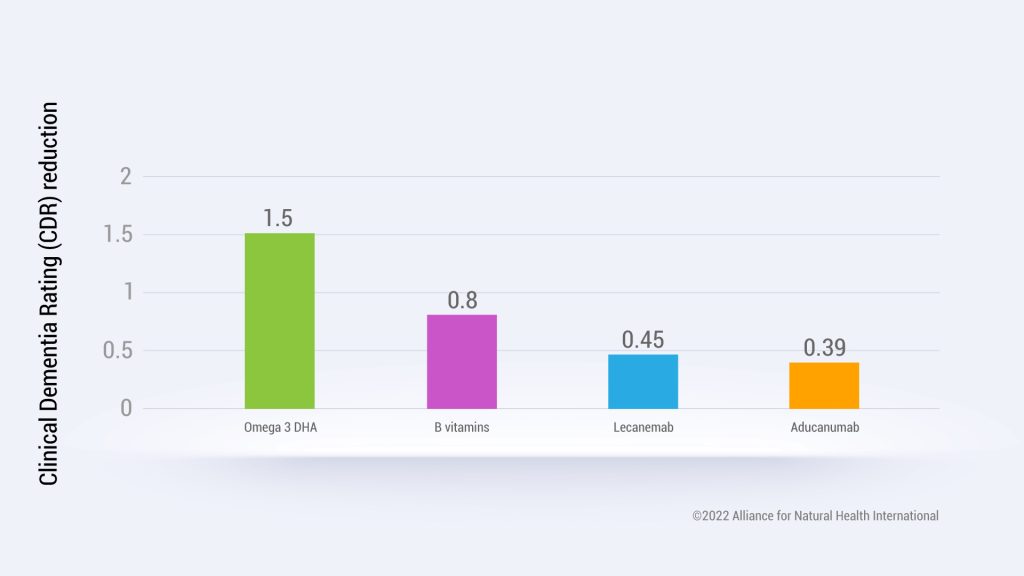Despite billions wasted on ineffective Alzheimer’s drugs, powerful natural solutions like B vitamins and omega-3s are being silenced. Action Alert!
Listen to the audio version of this article:
- Despite over $40 billion spent on Alzheimer’s drug development—most notably anti-amyloid antibody (AAA) drugs with minimal impact and major risks—natural interventions like B vitamins and omega-3s show far greater promise in reducing brain shrinkage and slowing cognitive decline.
- Contrary to fatalistic views about genetic inevitability, lifestyle factors—such as diet, exercise, supplementation, and stress management—can significantly reduce Alzheimer’s risk. Research shows nearly half of cases may be preventable by lowering homocysteine levels.
- The medical establishment and the government are suppressing evidence-based natural approaches—but ANH is working to change the tide with a new legal initiative to protect truthful speech about nutrient benefits.
Every three seconds, someone in the world is diagnosed with dementia. Some estimate that Alzheimer’s is really the third leading cause of death in the US. Behind each diagnosis is a real person—a mother forgetting her child’s name, a husband no longer recognizing his wife, a once vibrant soul fading into a mist of confusion and fear. And despite over $40 billion spent in the quest for a pharmaceutical cure, millions of people are still waiting for real hope. The crime is that there is hope: natural medicines have shown an incredible promise in helping to prevent Alzheimer’s, but Big Pharma and the government keep us from learning about them.
While pharmaceutical companies continue to roll out new Alzheimer’s drugs with great fanfare, the results have been profoundly underwhelming. Anti-amyloid antibody (AAA) drugs, designed to remove the telltale plaques from the brain, have failed to deliver meaningful cognitive improvements. That’s probably because the amyloid cascade hypothesis that has driven the development of AAA drugs provides an inadequate explanation of the pathogenesis of Alzheimer’s disease. Since 2003, 98% of Alzheimer’s drug trials have failed. Lecanemab, the latest claimed “breakthrough,” improves clinical scores by mere fractions—less than half of one point. Its predecessor, aducanumab, was so controversial that the FDA approved it against the advice of its own advisory panel.

The Truth About Genetic Risk—and Why It’s Not Your Destiny
Many people believe Alzheimer’s is genetic and therefore inevitable. This fatalism is likely keeping countless individuals from taking proactive steps. But science tells a different story: less than 1% of Alzheimer’s cases stem from inherited gene mutations. Even the widely discussed ApoE4 gene only modestly increases risk—it far from seals your fate.
Emerging research in epigenetics shows that gene expression is not fixed. Environmental, dietary, and lifestyle changes—like improved diet, regular exercise, quality sleep, and targeted supplements—can dial Alzheimer’s risk genes up or down. Millions could already be slowing or preventing cognitive decline, but they’re not being told how.
Prevention Through Nutrition: A Path Ignored
British nutritionist and ANH friend, Patrick Holford, and his nonprofit Food for the Brain Foundation have been advocating for a science-backed, nutrition-first approach that conventional medicine has largely overlooked. They emphasize that research shows that a combination of high-dose B vitamins and omega-3 DHA can reduce brain shrinkage by up to 73%.Compare that to just 2% for the best-performing AAA drugs.
A recent meta-analysis of 14 studies, published in the British Journal of Nutrition, confirmed that adults aged 60–70 who supplemented with B vitamins and omega-3s experienced significantly less cognitive decline than those who did not.
Another recent study found that a low-glycemic, Mediterranean-style diet paired with targeted supplements—including B vitamins, vitamin D, vitamin K2, omega-3 DHA, quercetin, and resveratrol—may significantly reduce Alzheimer’s risk even in those deemed genetically predisposed.
One of the key biomarkers in Alzheimer’s prevention is homocysteine, an amino acid that induces brain inflammation and damages neurons when elevated. High homocysteine is strongly linked to cognitive decline and brain atrophy, yet it can be lowered effectively with targeted B-vitamin supplementation. Studies across Europe and Asia consistently show that correcting B-vitamin and omega-3 deficiencies improves memory and slows progression—especially in the early stages of decline.
An important caveat: if someone is experiencing cognitive decline and it is not associated with raised homocysteine levels, the B vitamin/omega-3 protocol will not yield the benefits described above. But it’s estimated that about half of Alzheimer’s cases are preventable by lowering homocysteine levels.
Alzheimer’s Is a Whole-Body Disease—and It Needs a Whole-Body Solution
Alzheimer’s is not just a brain problem. It’s increasingly viewed as a metabolic disorder, sometimes called “type 3 diabetes.” It involves insulin resistance, chronic inflammation, oxidative stress, mitochondrial dysfunction, and poor methylation. Tackling a disease this complex with a single-target drug is like trying to plug one hole in a sinking ship riddled with leaks.
Dr. Dale Bredesen, a leading voice in Alzheimer’s prevention, puts it plainly: “Imagine having a roof with 36 holes in it, and your drug patched one hole very well…You still have 35 other leaks.” His personalized, multi-therapeutic approach includes a combination of dietary changes, sleep optimization, hormone balance, supplementation, exercise, stress reduction, and more. In real-world cases, some patients have even reversed early cognitive decline and returned to normal function.
Cronyism Blocks Real Prevention
Millions of cases of Alzheimer’s and dementia could be prevented with a simple, safe, and inexpensive intervention like B vitamins and omega-3 fatty acids. The question remains: why is no one talking about this?
This all circles back to issues we’ve raised for decades here at ANH. The medical establishment’s business model is predicated on treating sick people with expensive drugs, not preventing disease with inexpensive, non-patentable natural medicines. The government puts its thumb on the scale of the drug companies by censoring science-backed claims about the benefits of natural products for disease prevention.
ANH Initiative to Prevent Alzheimer’s
We’re working to turn the tide. We’re preparing a legal petition to dramatically open the marketplace to truthful speech about the benefits of nutrients for health. Companies are supposed to be able to use “authoritative statements” from government sources to make health claims on their products. For example, if the NIH said that studies have found B vitamins can lower Alzheimer’s risk and help prevent cognitive decline, companies selling B vitamins could make those statements. But the FDA has, in practice, blocked companies from doing this, muzzling free speech, preventing innovation, and depriving consumers of crucial health information.
Stay tuned for more details on this exciting legal initiative, but in the meantime, send a message to Congress urging them to allow the free flow of information about the benefits of natural products.




